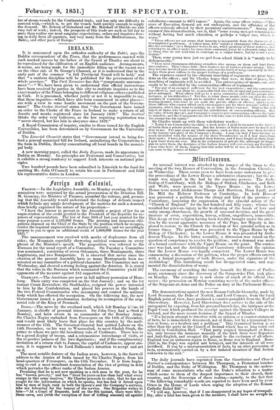Yilarttlattrung.
An unusual interest was attached by the temper of the times to the meeting of the two Houses of Convocation, in the Jerusalem Chamber, on Wednesday. There seems even to have been some endeavour to give the proceedings of the Lower House a substantive character ; but the attempt was nipped in the bud by the supreme powers. The Archbishop of Canterbury, with the Bishops of Oxford, Chichester, and Bath and Wells, were present in the Upper House : in the Lower House were noted Archdeacons Thorpe and Harrison, Dean Lyall, and Dr. Mill the Hebrew Professor at Cambridge. In both Houses"r'' was presented a petition from the clergy and laity of the province of Canterbury, lamenting the suppression of the synodal action of the "Church of England" for the last hundred and fifty years ; whence has resulted her grievous injury in the weakening of the bonds of love and unity among churchmen, the growth of unsound doctrine, and the great increase of error, superstition, heresy, schism, ungodliness, immorality. This decay of true religion having been forcibly brought under the attention by the recent aggressive measures of the Pope, her Majesty is implored to restore to the Church the freedom of her synodal action as in former times. The petition was presented to the Upper House by the Bishop of Chichester; to the Lower House it was presented by Archdeacon Thorpe. In the latter assembly, a discussion was raised on the question of competency to receive the petition; and a demand was made of a formal conference with the Upper House on the point. The conference was had, and the Archbishop of Canterbury delivered the opinion that the Lower House was legally competent. The Lower House was commencing a discussion of the petition, when the proper officers entered with a formal prorogation of both Houses, under the signature of the Archbishop ! This tantalizing result has disappointed some, and augmented the dissatisfaction of many.
The ceremony of searching the vaults beneath the Houses of Parliament, customary since the discovery of the Gunpowder Plot, took place on Monday. The ceremony is now shorn of much of its official elsemeter; the procession on Monday consisting merely of the under officers of the Sergeant-at-Arms and the Police on duty at the Parliament House.
The demonstrations against the new Roman Catholic hierarchy, made by Lord Beaumont, the Duke of Norfolk, and Lord Camoys, from the loyal English point of view, have produced a counter-pamphlet from the Earl of Shrewsbury. However, Lord Shrewsbury does service to the side of his antagonists by exposing, from his personal knowledge' the intrigues at the Papal Court which produced the rescript against the Queen's Colleges in Ireland, and the more recent decision of the Synod of Thurles. "If a layman attempt to interfere with an opinion or a counter-statement of facts, he is immediately denounced, not at Rome, but bya tyrannical faction at home, as a heathen and a publican." This tyrannical faction is no other than the party in the Church of Ireland which has so long ruled and agitated in Conciliation Hall. "That party reigned triumphant at Rome, too, only because the immense majority of the Irish there were Repealers and Anti-English, and occupied the ground to the exclusion of all others. England was an unknown region to Rome, as Rome was to England. Rome (that is the Pope) was cajoled and betrayed, and the interests of all were sacrificed. It was by a misrepresentation of facts, by an utter perversion of facts, systematically carried on by a few isolated members of that faction unknown to the rest."


























 Previous page
Previous page